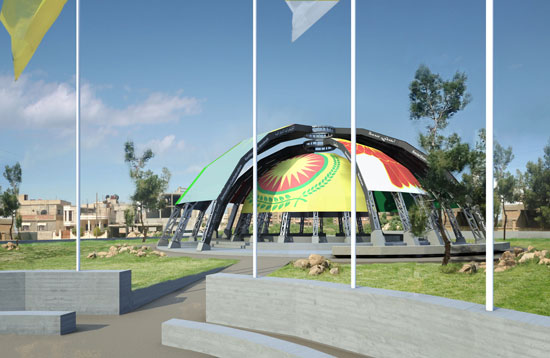In the January issue of e-flux journal, Jonas Staal visits the Kurdish autonomous region of Rojava, in northern Syria, to investigate how form—political, artistic, architectural—shapes ideology. Rojava, Staal argues, demonstrates how a radical transformation of form can enable a radical transformation of ideology. An excerpt:
The notion of “changing mentality” names that terrifying process, for we are not merely speaking of a changing of guards from Assad’s soldiers to Kurdish defense forces, but of a rejection of the internalized guards and the oppression the old regime represented within the individual performer. Non-state entities that change mentality move beyond the usual script imposed upon them through the form of the nation-state. Consequently, they live a dual form of terror: the terror of liberation, and the state-terror that is employed to punish those that engage in this process. For regimes such as Erdoğan’s in Turkey, the true terrorists are those that Hesso describes: the humans and cats that decide to go off-stage—or better, off-state—altogether. The fourth wall of the geopolitical theater that the Kurds are dismantling consists of performing the fact that life beyond the state is possible, even though no one yet knows exactly which form this life will take.
What we can say with regard to the new forms that the Rojava Revolution has developed so far is that the assemblage of radical institutions gathered in the Democratic Self-Administration of Rojava is essentially the “form”—or the transformative base—of stateless democracy. The formation is transformative in that its decentralized, conflicting, and complex structures are hard to unify even in thought. As such, they interrogate the very idea of what the form of a nation, people, or community is supposed to entail in terms of a homogeneous entity. The heterogeneous, self-assessing nature of power performed through the disciplined practice of stateless democracy attempts to undermine any monopolization of power by all possible means. While “discipline” might be considered a problematic term for some, for the Rojava revolutionaries the capacity to collectively govern goes hand in hand with the governance of the self. This governance no longer takes place through an external actor—the “cop inside our head,” in this case the former Assad regime—but through an attempt to define oneself as both an actor in and cocreator of the collective script entitled stateless democracy: a script that is performed off-state and thus, inevitably, a script that has to be performed as a terrorist.
Image: Drawing of the new public parliament and surrounding park in the city of Derîk, Cezîre Canton, in the autonomous region of Rojava, designed by the Democratic Self-Administration of Rojava in conjunction with New World Summit, 2015.
